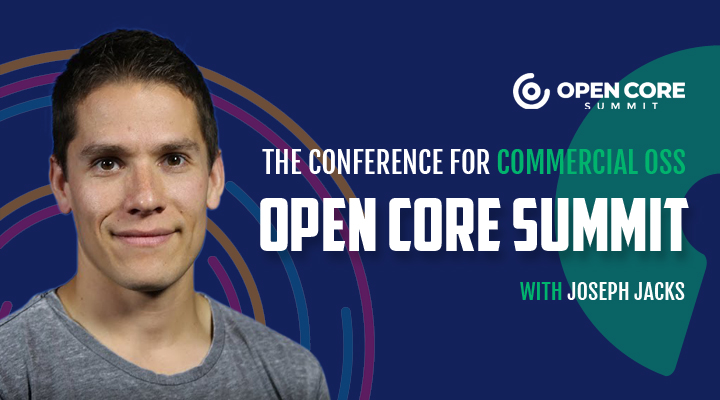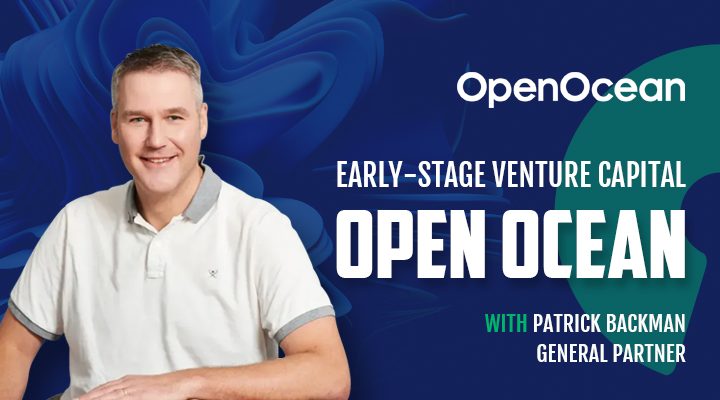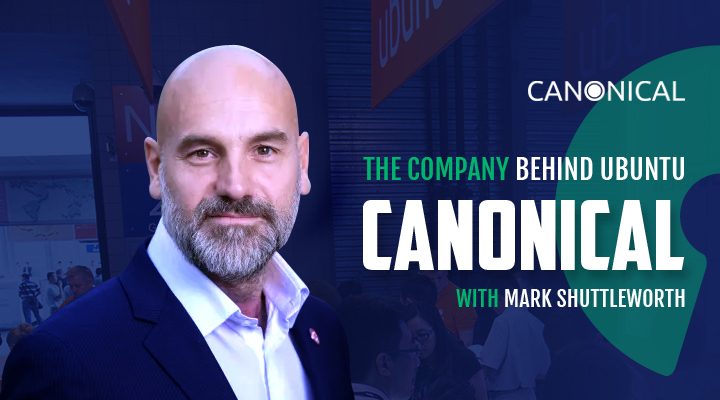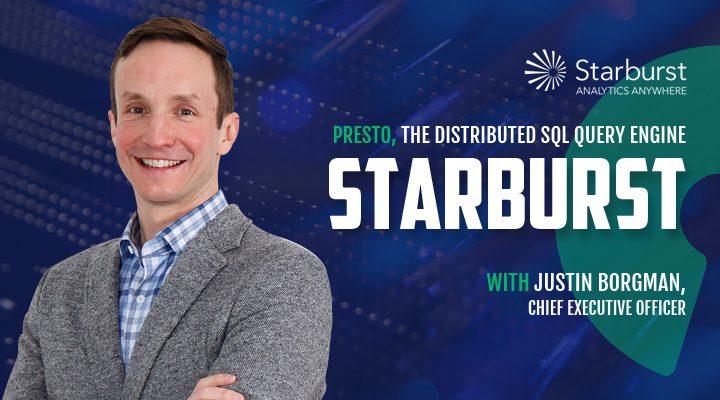
Episode 30: Open Core Summit – The Conference for COSS with Joseph Jacks
Podcast: Play in new window | Download
Subscribe: RSS
Joseph Jacks is the Founder and Organizer of the Open Core Summit (OCS), the world’s first commercial open source software (COSS) event. Joseph is also the Founder and GP of OSS Capital, a venture fund that invests exclusively in early-stage Commercial Open-Source Software (COSS) companies. In this episode, Joseph discusses the exciting origins of the summit, and why today’s investors still grapple with funding open source software businesses.
Transcript
Intro
Michael Schwartz: Hello and welcome to the Open Source Underdogs podcast. I’m your host, Mike Schwartz, and for this episode, we’re breaking format.
Today’s episode is about the Open Core Summit in San Francisco from September 18th to 19th.
That’s September 2019, in case you’re listening to this podcast after it’s too late. That’s really soon, so if you don’t have your tickets, get them now.
With me today is Joseph Jacks, Founder of OSS Capital and founder of the Open Core Summit. He’s going to help fill in some of the blanks about what this conference is about.
Origin
Joseph, thank you so much for joining us today.
Joseph Jacks: Thank you for having me.
Michael Schwartz: So, what’s the origin story of the Open Core Summit?
Joseph Jacks: The Open Core Summit really was an idea of a friend of mine, Marco Palladino, he’s the Co-founder and CTO of a really great COSS, Commercial open source Software company called Kong.
The company behind the Kong API Gateway Management Platform, and Marco and I were actually at re:Invent, I believe, late last year in 2018, talking about commercial open source business models.
Kong uses one of the most widely implemented and sort of successful business models for commercial open source companies, which is the sort of open core approach to have the open source permissibly licensed core project. And then they add value around that with differentiated experiences for enterprises that materialized as hosted cloud services, and packaged offerings, and security, machine learning, monitoring, and logging, and packaging, and, overall, sort of robust performance and security SLAs, and so on. They are a really interesting company.
Marco is a really smart and brilliant friend, and I sort of took that idea and sat on it for several months. We wanted to actually do conference in May, but the last nine months have been pretty insane.
So, Open Core Summit is really about galvanizing and celebrating the category of commercial open source software, which really represents the companies that exist to commercialize core open source software projects that are the fundamental basis for a given company.
For example, like RedHat wouldn’t exist without Linux, Elastic wouldn’t exist without Elasticsearch, Hortonworks Cloudera wouldn’t exist without Hadoop. Redis wouldn’t exist without Redis the project, Alfresco Acquia without Drupal, Databricks without Spark, DataStax without Cassandra, and so on.
We sort of classify Commercial open source Software companies, or COSS companies, as companies that fundamentally wouldn’t exist if the core open source project didn’t exist. And sort of thinking pretty deeply about this, tracking the fundamentals of the ecosystem plus activity, particularly over 2018, the timing for a community ecosystem conference on a global basis that really serves to kind of bring together a wide range of ideas, and perspectives, and opinions across, in particular, founders and open source maintainers and contributors, but also executives, enterprises, enterprise customers, cloud providers, investors, analysts and so on. Really in a sort of format of a conference that could sort of scale geographically, and serve to kind of be the basis for knowledge sharing and networking and best practices and collaborations, and sort of like a common meeting place for ideas and evolution.
That was really the core inspiration for Open Core Summit. We are obviously really excited to have a first one coming up in a few weeks here in San Francisco, September 19th and 20th. I’m really honored to have a phenomenal lineup of founders of companies like Fastly, Elastic, Confluent, Kong, Alfresco, RedHat, Amazon, Google, and many other companies.
Who Is Attending?
Michael Schwartz: Awesome! What types of people are registering for this event?
Joseph Jacks: It’s a combination of all the folks I mentioned, kind of all those different constituents, open source maintainers, founders, executives that work at kind of commercial open source ecosystem landscape.
So folks in product marketing and engineering, hiring, strategy, finance, licensing, go-to-market, and lots of cloud provider kind of community is attending and supporting. We’re seeing a good amount of infrastructure, IT, enterprise end-user community.
We actually have a track dedicated to the enterprise voice and perspective, so, enterprise is consumed and purchased commercial open source technology from the vendor ecosystem. If you look at a bank or insurance media, Telco, Fortune 2000, Fortune 500 company, they are on a sort of buy-side, kind of a consumer procurement side of a commercial open source.
So, increasingly two big shifts and things are happening there. Obviously there’s a move to the cloud, move to managed services, Amazon, Azure or Google, but also a simultaneous and sort of in tandem move to commercial open source, which is sort of relying and leaning on the vendor ecosystem there, as every enterprise is adopting open source from the bottom up through developers, into a corporate IT.
And they really need to work with vendors to kind of pardon and build trusted solutions and kind of lean on those vendors for production insurances, so vendors like Elastic, Confluent and obviously RedHat, and many other companies that provide a variety of business models and services around the open source projects they maintain are very appealing to CIOs and CTOs at Fortune 2000 companies. We hope to see overtime lots of participation from that user community as well.
I think the biggest concentration we’ll probably see at the first conference is a lot of interest, at least from what we are seeing so far, in registrations over the next few weeks – I think that will further materialize – is open source containers and founders, sort of aspiring founders as well, along the spectrum.
So, from sort of idea stage to folks working on a company, or interested in building and scaling a company, looking at potential options for funding, looking at potential options for hiring, and strategy, go-to-market, various things like that.
And really kind of selfishly, people want to pay most attention to that constituency, mostly because I think part of the sustainability conversation is really going to concentrate around how we can support, and enable, and provide tools and learning frameworks and access into folks who have built and scaled projects and repositories, from sort of like first commit to through to an IPO, for the next generation of open source founders, open source creators and maintainers.
Biggest Challenges of open source Startups
Michael Schwartz: What do you think are the biggest challenges today for companies using open source as part of their business?
Joseph Jacks: I think some of the biggest challenges kind of revolve around contribution and sort of expectations and dynamic around security, the vendor ecosystem and really what open source means fundamentally.
At the end of the day, a lot of those issues and challenges don’t really look like challenges and issues if you dig hard enough.
Basically, every company on earth uses open source, and they use it very heavily. The sort of converse is not true, in terms of contributing back and giving back to those projects when it comes on to co-commits and actual engineering investment, a very small fraction of enterprises would actually go and have dedicated explicit mandates to contribute backup stream.
Having said that, even if those mandates and explicit initiatives and open source program offices don’t exist, even if they don’t exist, what does happen, which is great, is a pretty significant fraction of developers, who are actually using consumed open source, will file a bug report, or potentially fix something really minor, if potentially, something really jumps out to them, and then, touches and inspires them, while actually maybe spending time and maintaining and contributing engineering time to a project.
I think it’s sort of a high entropy, very hard to measure, and make universal statements about kind of dynamic. Mostly because we don’t really know and we don’t have a way to determine the extent of contribution back at open source, from the consumer side, from what as enterprise or cloud providers, what have you.
It’s quite a lot of important and interesting things there, but I don’t believe we can make categorically sort of universal statements about what is or isn’t happening. Obviously, there are instances where most companies consume and take more than they give. But, I guess, having said all that, whenever this question comes up – because this is a very common question – what are the biggest challenges, sort of contribution getting back topic always comes up.
I always think of a quote by Doug Cutting – who was the engineer creator behind Apache Lucene, Apache Hadoop, and a few other things – and what he said is sort of insane, to expect proportional contribution back to open source, relative to value received from it, or benefits received from it – I’m paraphrasing slightly. I tend to agree with Doug, and I think that that’s sort of correct way to think about open source in terms of the give and take dynamic. There’s lots of interesting evolution here, lots of really cool projects and initiatives happening these days, so, it’s a cool time to be in a community.
Do Investors Care About Open Source?
Michael Schwartz: Putting on your investor hat for a second, I was recently reading an S-1, and the only mention of open source was as a risk that there could be some liability around this company’s use of open source. Is this view changing? And the company’s use of open source to investors, just sort of like a non sequitur.
Joseph Jacks: I think probably more the latter, and I hope it changes. We’ve seen, one, commercial open source IP of the Sierra is Fastly. So, Fastly fundamentally wouldn’t be where they are today and arguably, wouldn’t exist without, Varnish, the Edge Cache proxy technology, they build a wide range of products on top of CDN, among other things.
And Fastly calls out open source quite extendible. It has a pre-promised position. I think it depends on the company. If you look at WeWork or CloudFlare, and other companies, maybe Peloton, I think Ben Thompson, from Stratechery, actually wrote a post earlier today about what constitutes a tech company, what’s a sort of definition of a tech company.
If we sort of like follow logical reasoning of, are all companies becoming tech companies – or, maybe let’s just say yes, and they are all tech companies, software companies – most tech companies use software pretty heavily. And further, all software companies rely heavily on open source – that’s a definite yes.
You need to sort of like make the recursive loop back to all companies are becoming tech companies ultimately are all companies heavily relied on open source. So, that’s kind of like massive, global macro dependency.
I’d say that in that light over time, I think we’ll see more prominence and understanding in the public markets, the retail/investor landscape, and whether it’s IPOs, or increasingly direct listings that are potentially more appealing and interesting than IPOs.
Recognition and acknowledgement of open source is sort of a fundamental driver for innovation. I hope we see that shift. One of the passing things that we have on our plate with OSS Capital is to dig into the recent flurry of S1s that really are software company S1s, and determine how extensively they call out open source as part of their company positioning and product strategy, differentiation, and so on.
As you point out, most of the references of open source are listed in the risks section due to trademark, IP protection, and risks around that. So, it’s kind of like a common land out there in the risk section that lawyers kind of put down. In fact, if you look at every five or ten S1s, the wording is almost identical, it is kind of boilerplate.
But companies like Elastic, or Pivotal, or Fastly, Hortonworks, a handful of others, that are commercial open source companies, having IPO over the last 18 months, you’ll see much more extensive acknowledgement and sort of elaboration on open source as part of their strategies.
But I think even in those cases, it’s not quite articulated enough as a sort of fundamental driver in building block for why those companies are different, and why they sort of like have the ability to create more value than, say, companies that are fundamentally closed and proprietary at the core.
Common Themes
Michael Schwartz: Do you see any emerging themes in the sessions?
Joseph Jacks: I think the biggest common theme that the speakers are looking to talk about is how business models are evolving, and the topic of what defines open source, and what does open source licensing look like in the era of core license innovation.
We’ve seen lots of “source available” licenses that actually are not open source licenses in the sense of adhering to permissiveness, definitions laid out by the OSI, or, for that matter, free software foundation, or the copyleft evolutions of the last couple few decades.
I’d say that more interest in business models and licensing will probably be the case for this first conference. And over time, I think what we hope will happen is the sort of elaboration and content focus on why product development is different in a commercial open source context, why go-to-market is different, why engineering is different, why hiring is different, because all those functions, quite differently – from a behavioral and implementation perspective – inside of these commercial open source companies as compared to previous generation fundamentally closed-source proprietary software technology companies.
Closing
Michael Schwartz: I’ll just say that sounds like it’s going to be quite an event. And I wanted to say thank you for joining us today, and we’ll see you in about two weeks.
Joseph Jacks: My pleasure. Thanks so much for having me, Mike.
Michael Schwartz: Joseph has just done a fantastic job putting together an Action Packed 2-Day Agenda.
Many of the guests that you heard on this podcast will be at the Summit, like Ofer Bengal of Redis, Martin Dougiamas of Moodle, Tom Hatch of SaltStack, Emil Eifrem of Neo4j, John Newton of Alfresco, Jay Kreps of Confluent, Michael Howard of MariaDB, Paul Dix of InfluxData, Sid Sijbrandij from GitLab, and several others you’ll hear in future episodes.
In fact, we’ll be recording two episodes in person at the Summit. So, if you’re a founder, developer, investor, analyst, or just a person excited to learn, meet and collaborate, and all things, at the intersection of open source software and business, this conference is definitely for you.
Thanks to Melissa Park for helping to schedule the podcast amidst all the chaos of planning a conference.
Transcription and episode audio can be found on opensourceunderdogs.com.
Music from Broke for Free and Chris Zabriskie.
Audio editing by Ines Cetenji.
Production assistance and transcription by Natalie Lowe.
Operational support from William Lowe.
If you have any comments or thoughts, tweet at us. Our handle is @fosspodcast.
As promised, the next podcast will feature Peter Zaitsev from Percona. We’ll push up one next week. Until then thanks for listening.




